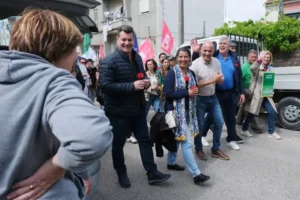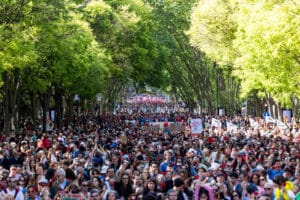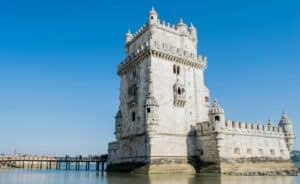2021’s municipal elections in Portugal will go down as the moment PS Socialists ‘won’ without being able to ‘shout from the rooftops’.
As leader writers have all explained, pre-election polls predicted a resounding PS victory. It wasn’t. Instead of the 170 municipalities clinched in 2017’s elections, the country’s ruling party ended up with just 149 – and even some of those are hollow wins, without an overall majority.
But, more importantly perhaps, lead-up polls also predicted “the political defeat” of PSD leader Rui Rio – and that most certainly hasn’t happened.
Rui Rio has emerged from the exercise reinforced: the best news of all for his centre-right party being that Carlos Moedas, in coalition with CDS-PP, Aliança, MPT and PPPM, snatched Lisbon from PS control, leaving already seriously-damaged mayor Fernando Medina (click here) eating extremely humble pie.
Lisbon’s loss to the Social Democrats has been interpreted as a ‘red card’ to António Costa. A warning shot that PS impunity can be blown away with the power of coalitions. But it most certainly won’t be a walk in the park: Carlos Moedas is up against a red wall of councillors when it comes to the passing of any decisions or policies. The PSD coalition has seven councillors, so does the PS; then there are two PCP communists and one Bloco de Esquerda. Both parties are much more likely to band with PS than ever extend their hands to the PSD. Moedas, to his credit, has said he is willing to work with all parties, and forget “political friction”.
But Lisbon wasn’t the only ‘key’ municipality where the PS suffered important losses. Coimbra and Funchal (Madeira) both ‘fell surprisingly’ and absolutely too – the first to a coalition involving the PSD with six other parties, the second to the PSD outright, while Porto was held (albeit not quite so robustly as before) by Independent Rui Moreira, and Oeiras once again showed its support for charismatic Independent (former PSD) mayor Isaltino Morais.
Citizens movements also showed their power this time round: in the Algarve, Vila do Bispo almost fell to SPCVB (Somos Pelo Concelho de Vila do Bispo), and loses its traditional PS majority; Aljezur also saw a run for power by the Renascer group, which now has two councillors against the PS’ three. Elsewhere Marinha Grande, Elvas and Golegã saw local groups oust PS power completely.
The country is no longer ‘massively pink’ (the colour of the Socialists); there is a lot more orange (PSD); a few bastions of red (CDU communists) and just a touch of blue (CDS-PP).
The latter two parties, PAN and Bloco de Esquerda emerge from the elections like sleepwalkers. They have all either ‘dismally lost ground’ (this particularly refers to the communists), or simply failed to make any impact at all – though CDS-PP at least makes up some of the PSD coalitions.
As for Chega and leader André Ventura’s confidence that it would have significant gains, this barely transpired. Yes, the party has seen two candidates with seats on Algarve borough councils (Portimão and Loulé) but the ‘cherry-on-the-cake’ presidency of Moura municipal assembly that Ventura hoped for eluded him.
Meantime, Iniciativa Liberal has made the best of its first election in which it won 1.29% of the votes, suggesting ‘the party is on the road to greater things…’ (it will have to be).
In all the brouhaha and shocks, political dinosaur Pedro Santana Lopes snuck in from the cold to ‘return’ as mayor of Figueira da Foz for citizens movement Figueira a Primeira, only very narrowly beating PS. His advantage however is that with one PSD councillor voted in, he should have a working majority.
It was what pundits would call ‘an unexpected night’ – and in spite of being ‘overall winners’ in national terms, the PS government has not emerged the stronger for it.
PM António Costa did his best to say ‘the country isn’t Lisbon’, but it equally isn’t as pink as it used to be, nor as strong where it is pink.
Said PSD’s Rui Rio: “This has been an important day for all Portuguese, because municipal councils make decisions every day which are very important for our lives.”
Needless to say abstention was still a major stumbling block, running at just under 48% nationally – the second highest rate ‘of all time’
President Marcelo, who did his best to encourage the people to vote – even on voting day – lamented citizens’ apathy, saying: “elections are always fundamental in a democracy. I would have liked to see greater participation”.
Within hours of the results, some newspapers were ‘predicting’ a long-overdue government reshuffle, blaming PS Socialists, and particularly prime minister António Costa, for being ‘too arrogant’ in the way he had handled the campaign.
In characteristic form, Mr Costa to date has refuted that there needs to be any kind of reshuffle.




















